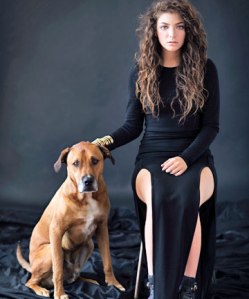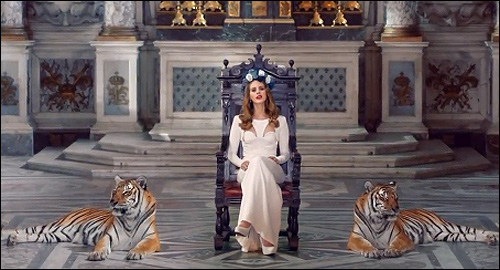Why "Royals" Isn't The Song You Think It Is or: Lorde Is Lying to You
posted in: Music News
Everybody has heard Lorde’s ubiquitous tune “Royals” somewhere at this point. It was on heavy rotation throughout the summer and has ruled the Billboard Hot 100 for the last two weeks, beating out pop record-destroyer Katy Perry’s new song “Roar” (which, honestly, is a pretty weak effort in itself “ I’m talking to you, Dr. Luke). This is, at the same time, both totally predictable and incredibly interesting.

Lorde has a great voice, a solid stage presence, and she doesn’t write bad songs to boot (and yes, she does write at least part of her songs, though her strong co-writing team consists of a few seasoned vets from the pop-punk scene back in New Zealand, and we all know those dudes know how to write a hit). All of these factors notwithstanding, the song that’s getting the most play from her EP and album is objectively nowhere near the best tune on either of those releases, which arguably contain way better songs than the finger snappy harmony-laden hypnotism of “Royals.” And, weirdly, from a surface-level lyrical scan “Royals” reads like a straight-up denunciation of pop materialism, making it the complete opposite of what people have been clamoring to hear for the last decade or so. Check out this stanza:
But every song’s like:
Gold teeth
Grey Goose
Tripping in the bathroom
Bloodstains
Ball gowns
Trashing the hotel roomWe don’t care
We’re driving Cadillacs in our dreams
Even though Lorde makes a laundry list of the trappings of crass materialism as if she’s a giddy rapper who just got his first advance from UMG, she is quick to tell you: ‘We don’t care! This isn’t us! We don’t need to own these material things to be happy!’ Not only that, but Lorde insinuates that she and her intended audience are even better off without those things.
Then why are you most likely to hear “Royals” bumping from the tricked-out speaker system of a luxury SUV? Are too many people with selective listening habits just misinterpreting the song? Well, that’s definitely part of it; and in the contemporary atmosphere of excessive brand call-outs, it’s hard for songs critical of those tendencies to be appreciated for what they “actually” mean (read: “Gucci Gucci”). But, I would argue in this case, “Royals,” the song itself, is the real culprit here more than its listeners are. And while it might be hard to understand the immense popularity of a song that broadcasts a truly sincere message of anti-materialism, it’s a lot easier to understand the immense popularity of a song that¦well¦actually does the very opposite.
Let’s go back to the lyrics:
But everybody’s like:
Crystal
Maybach
Diamonds on your timepiece
Jet planes
Islands
Tigers on a gold leashWe don’t care
We aren’t caught up in your love affair
Look, I’m not going to make the argument that just because Lorde is on a major label, she can’t offer up some sort of valid countercultural arguments about money and consumption. That’s a cheap shot, and is not (entirely) true. After all, one does have to have wide exposure in order to introduce a new social perspective. Maybe in tackling the pernicious culture of American materialism, Lorde has chosen the perfect medium to influence the most people possible: a commercial pop song.
There’s just one problem: it’s a commercial pop song. By definition, a pop song decrying conspicuous consumption is like some rich oil tycoon telling the poor folks on the bad side of town that it’s OK for them to be poor “ that in fact, it’s preferable, because it’s a more “authentic” existence than his own supposedly bloated and meaningless one. Of course, he tells them this to subjugate them into a further cycle of consumption of the very products that HE is creating so that he can perpetuate his own moneyed existence. Yes, it’s economic like that. Sorry for the old man rant. Two points:
- Lorde is making music to sell music to you. There is tremendous money in pop, and it is made to be consumed and purchased, otherwise it will not exist. There’s nothing inherently wrong with that, of course. BUT it reveals how hypocritical it is to craft a pop song (not just any song, but a POP song) that rails against consumption.
- Lorde’s press persona is that of a young upstart who came into the game totally by her own merit. And while Lorde was found to be exceptionally talented at a young age “ which she obviously still is “ she was then courted and incubated for future stardom by Universal, which carefully plotted out marketing plans and release schedules. (This is how pop music works.)
So while Lorde’s image, as bolstered by the anti-materialist sentiment of “Royals,” is presented as a contrast to people like Lana Del Rey (who she directly calls out in her “tigers on a gold leash” line), the team behind Lorde’s success “ and it is a sizeable team “ is subtly using that same iconography to market her. Look at this image of her with her dog:

OK, yes I know dog is adorable, but focus! Now, look at this photo of Lana Del Rey:

Same vacant, open-mouthed, sexy stare. Virtually the same confident, seated stance with powerful animals by their sides. These are the poises of powerful women and there is no coincidence that they are similar. While the dog in Lorde’s photo establishes her as a more down-home personality than Lana’s overblown image of her own royalty, the intention and impact is still the same, and in that way, there is barely any difference.
So what’s the problem? Why can’t a pop musician write a song saying how ridiculous all of the materialism in pop is? Well, she can (obviously). The issue is simply that there is innate hypocrisy in how “Royals” has gone about it. By singing “We’ll never be royals,” Lorde lumps herself in with the sweaty, starving, overworked and underpaid masses. But, of course, she is speaking from the bully pulpit of pop music, which, ironically, makes her virtual international royalty in our entertainment-saturated age. What’s more, she’s spinning a yarn of material success as something really not that great and desirable when her song is engineered to produce the very material wealth that she’s criticizing. But doesn’t that message sound better coming from, say, a sad clown?
For what it’s worth, I am not blaming Lorde entirely for this hypocrisy. We’re all implicated as listeners and consumers of pop music, and what we choose to consume makes a huge difference. To put it all into context, it’s not really a huge deal. After all, this kind of thing has happened many times over in pop history. I mean, just look at the mainstream appropriation of punk to sell counterculture to bored suburban teenagers who hang out at the mall. At least then you didn’t have to pose with a tiger.
Follow Mikel on Twitter @Dream_Arcade
